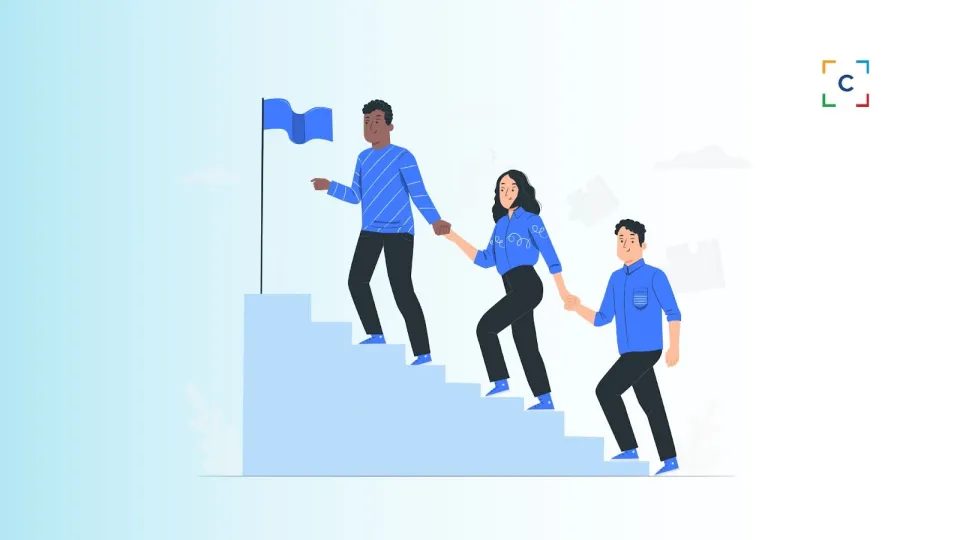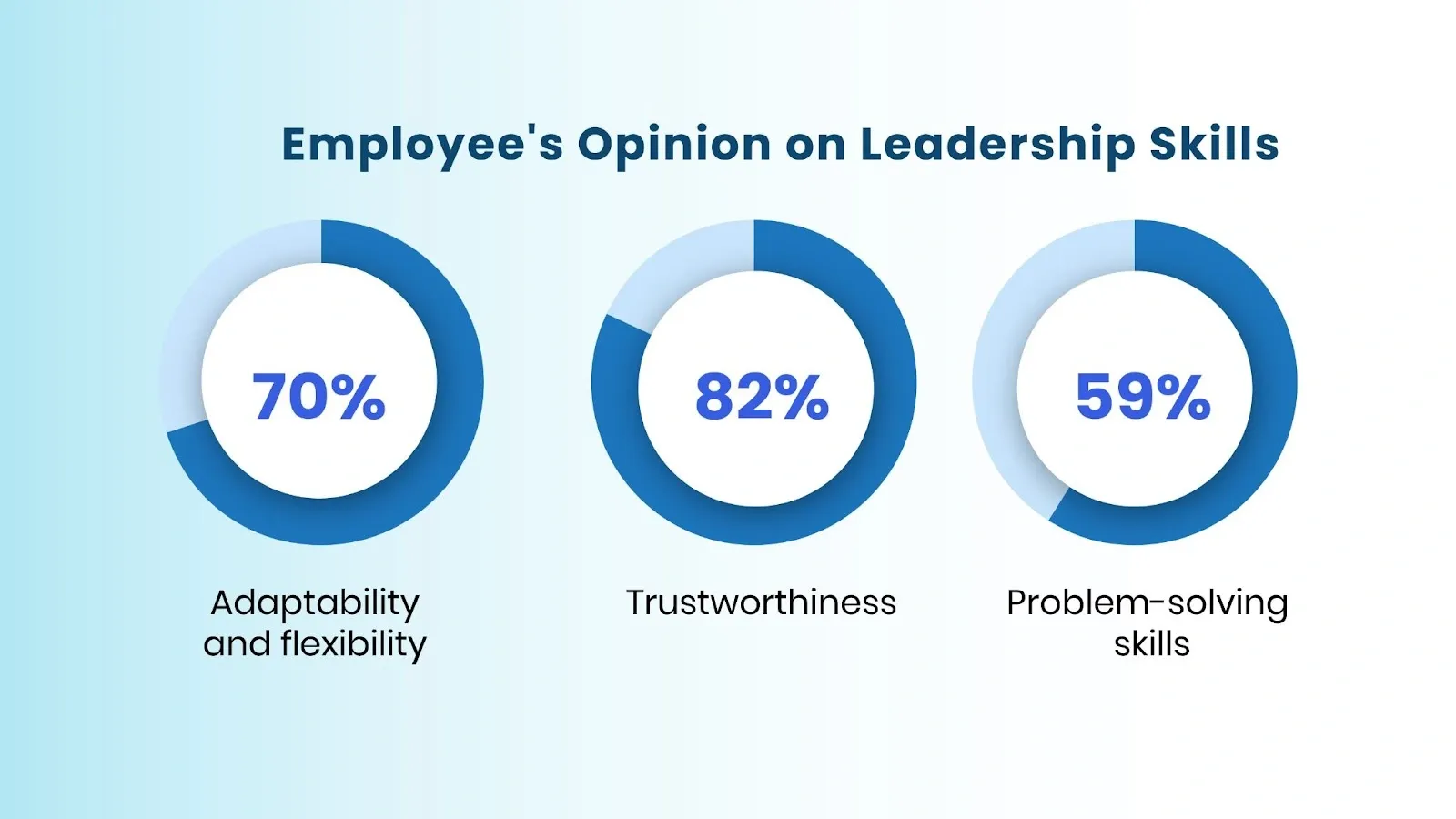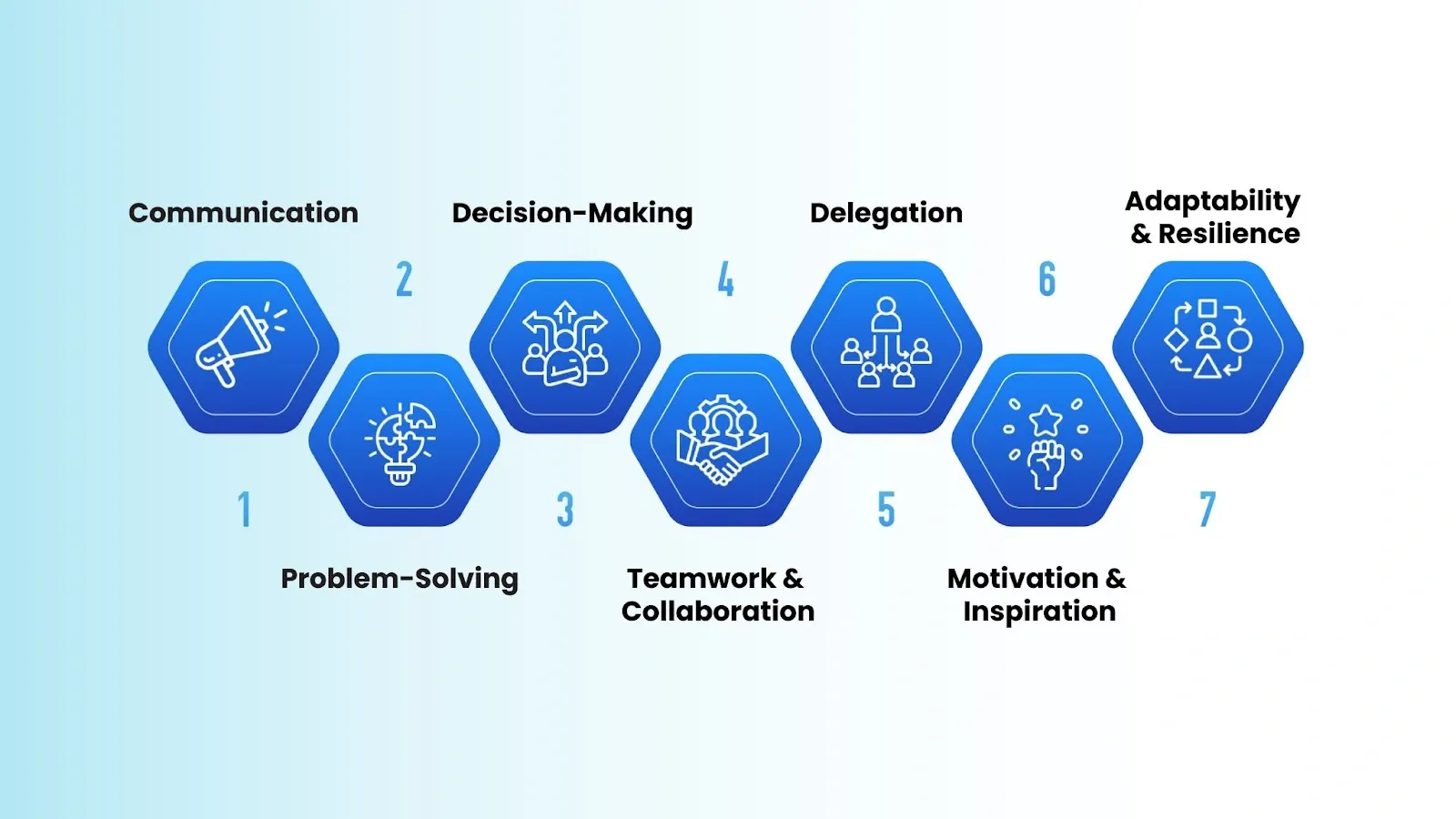Top 7 Leadership Skills & Examples for Resume | Leadership Skill Resume

Being a leader is not only about getting work done!
A leader guides and motivates people for a common cause. A good leader manages team dynamics in the workplace and focuses on achieving organizational goals. Not only this, but one must also look into team development and help in individual professional development.
Being a good leader is not a one-time position. A good leader should develop different leadership skills and maintain positive relationships. So, leadership skills in a resume are one of the crucial elements that an employer looks into.

According to some sources, around 70% of employees believe adaptability and flexibility are important leadership skills in today’s dynamic work environment. 82% of employees identified trustworthiness as a critical leadership skill in a resume. Problem-solving skills are ranked among the top three crucial skills for 59% of employees.
This number shows how employees value leadership skills in resumes. In this blog, we will explore seven must-have leadership skills in resumes and their importance in the workplace.
Understanding Leadership skills
Before learning about those leadership skills, let’s understand what leadership skills are and the different categories of leadership skills.
What are leadership skills?
In the workplace, leadership skills are the qualities and abilities of an individual who can provide clear guidance to their team members toward a common goal. This process involves inspiring and influencing colleagues. Not only these but also other skills such as problem-solving, delegation, and decision-making are involved. Leaders use these skills to guide and motivate their colleagues and team members to work together to achieve a common goal.
When motivating team members, a leader needs skills like emotional intelligence, empathy, and adaptability. These help leaders understand people at their emotional level, which will help them manage their team during challenging situations.
Types of Leadership Skills
- Interpersonal Skills: Such skills allow leaders to interact effectively with their colleagues in the workplace. They can understand their colleagues' emotions, which helps them to solve internal conflicts and disputes. Strong interpersonal skills will increase trust in leaders and build a positive work environment.
- Cognitive skills: These mental abilities allow leaders to think, analyze, and solve problems. Leaders are expected to develop strategies and find solutions for complex challenges, so these cognitive skills are considered crucial for them. These include skills like decision-making, problem-solving, strategic thinking, etc.
- Organization skills: These skills help organize things and use them efficiently. A leader should manage resources, tasks, and time effectively in the workplace. These skills ensure that assigned tasks or projects are completed within time and budget. For this, a leader should be able to delegate tasks, manage time, and think strategically.
- Motivational skills: these skills help a leader to inspire and encourage their team. Such skills are qualities that a leader should acquire or develop to lead a successful team. These skills are also used to face critical crises in the workplace by motivating the team members for a smooth workflow.
How to add leadership skills to resume
- Identifying your leadership experiences: before you add leadership skills, identify what leadership skills you already have and what you need to achieve to fulfill your dream job requirement. Use your existing leadership skills to list your experience in your resume. Show how you performed your roles and responsibilities to pinpoint those leadership skills. It can be managing your projects or motivating your colleagues.
- Showcasing leadership skills through action: instead of just listing your leadership skills, use some examples to explain them. It allows your employers to trust the skills you mentioned and helps them understand your expertise. For example, I managed a team of 15 members and increased revenue by 20% in the last quarter. Such representation increases your credibility.
- Tailoring your leadership skills to the job: When applying to different job roles, tailor your leadership skills to match your resume. Different job roles might have different skill requirements, so check the requirements and update your leadership skills. Your skills should match your employer’s requirements for the job position.
7 Must have Leadership skills

- Communication skills: Everyone can communicate, but it's essential to convey information or messages accurately. The purpose and meaning of the message should be clearly delivered, whether verbally or in writing. Employers appreciate these skills in resumes because they ensure effective interaction within the workplace and with clients, leading to better collaboration and fewer errors.
- Problem-solving skills: The capacity to comprehend difficult situations, pinpoint underlying causes, and devise strategies to address or resolve them. Employers value problem-solving skills because they enable you to handle various situations and develop effective solutions. These skills encompass critical thinking and creativity.
- Decision-making: Employers often seek these skills without explicitly mentioning them. Decision-making is considered a vital and commonly expected ability. For employers, it is crucial to determine if you can make smart decisions in difficult situations at work. This requires understanding each challenge's pros and cons and your decisions. Additionally, you must be prepared to face the consequences of your choices.
- Teamwork and collaboration: the ability to effectively work with others at the workplace towards a common goal. Such skills not only help you in working together but also allow you to build a positive work environment. An employer will love to have people who can foster such a working environment.
- Delegation involves the process of allocating tasks and responsibilities to other members. As a leader or while developing your leadership skills, you must trust your team’s abilities, provide clear guidelines to them, and offer support. An employer would assess how you manage work and assign tasks.
- Motivation & inspiration: These are the most important leadership skills to harness to represent oneself as a suitable leader. A leader knows how and when to motivate and inspire their team members. When a leader fails to motivate their teammates, it's often seen that they lose productivity and efficiency in their work.
- Adaptability and Resilience: An employer would like to have someone at the workplace who is flexible and able to adapt to any change in the working environment or work. Someone who can understand the dynamics of a team, workplace, and any challenging situation and adjust to it accordingly.
Introducing getCREDIBLE: Professional Credibility Builder
getCREDIBLE is an online platform designed to boost professional credibility. It provides a robust tool for creating and managing digital resumes that display your educational history, work experience, and significant accomplishments. One of its standout features is the capability to integrate real-time updates and project milestones, enabling professionals to highlight their continuous growth and achievements in their fields.
Key Features of getCREDIBLE
- Slate: With getCREDIBLE, you can create your digital resume, known as a slate. The platform's interactive dashboards and various features help you craft an effective and appealing resume, enhancing your professional credibility.
- Feedback Feature: getCREDIBLE allows you to receive feedback from peers and professional network members. Based on their input, this feedback generates ratings, helping you understand and improve your professional standing.
- Milestone Feature: You can post your achievements and recognitions as project milestones. Sharing these milestones on your profile significantly impacts your professional network, further enhancing your online presence.
How getCREDIBLE can help in enhancing leadership skills in resume
Upgrading your digital resume and boosting professional credibility is simple with getCREDIBLE features, which also help you present and improve your leadership skills in your resume. Here’s how:
- Feedback Feature: getCREDIBLE allows you to collect feedback on your performance and achievements from project members and peers. This feedback highlights the leadership skills you used to reach your goals and provides a comprehensive picture of your abilities and contributions.
- Milestone Feature: You can add your accomplishments as milestones in your digital portfolio. This feature emphasizes the leadership skills you employed to achieve these milestones, demonstrating your expertise and growth.
Conclusion
Listing your leadership skills in a resume is not just about scattering them throughout the document but showcasing them creatively and effectively. Present them in a way that you possess all sorts of leadership qualities to the hiring managers and align perfectly with the job role.
With getCREDIBLE, you can create a strong digital profile and more effectively highlight your leadership skills using its unique features.
Register today at getCREDIBLE for free and see the benefits for yourself.
Frequently Asked Questions
- How do you show leadership skills on a resume?
- Use the right action verbs, such as “led,” “managed,” and “coordinated,” to describe specific leadership roles and achievements.
- What is an example of a leadership statement in a resume?
- “Led a team of 15 to accomplish a project before a week of deadline and improved efficiency by 25%.”
- What are good leadership qualities?
- It includes effective communication, empathy, delegation, adaptability, motivation, and inspiration.
- What are the basic leadership skills?
- Decision-making, communication, emotional intelligence, delegation, and motivation
- What are the fundamental 4 leadership skills?
- Self-awareness, communication, influence, learning agility
